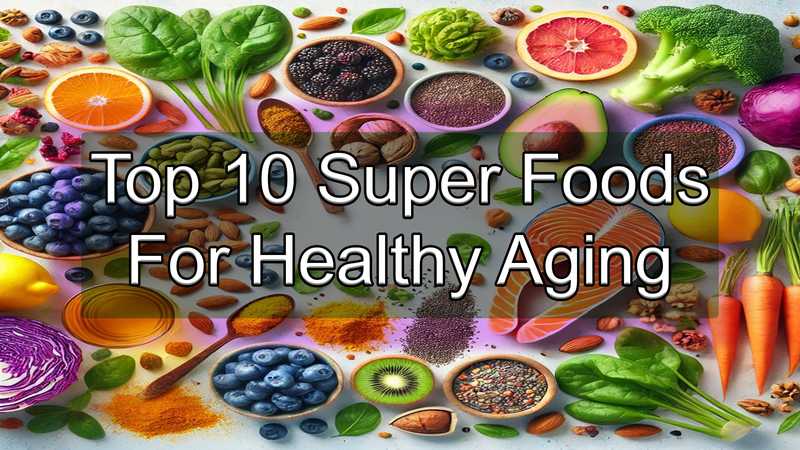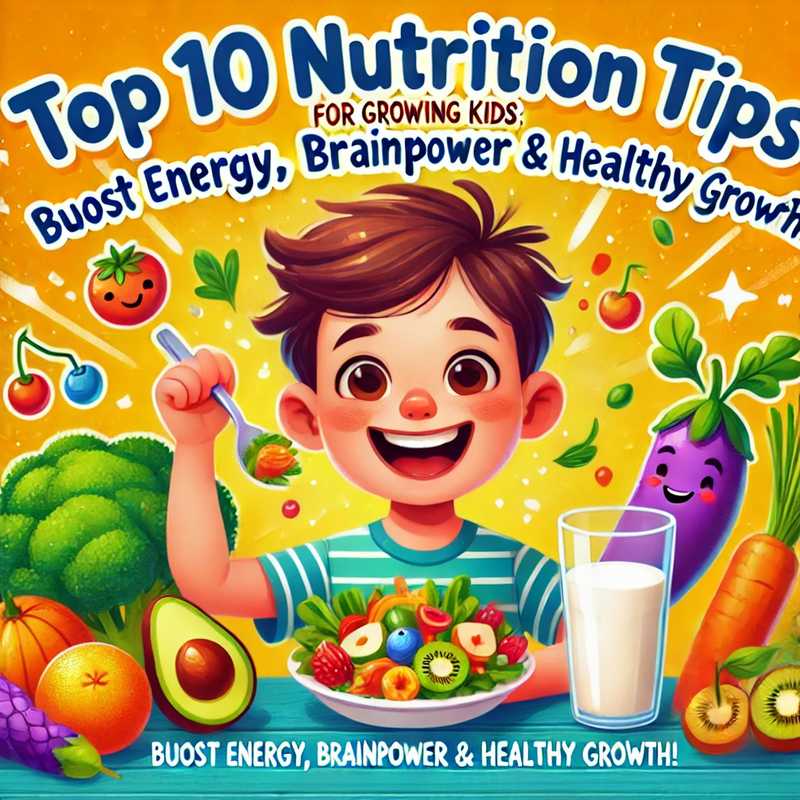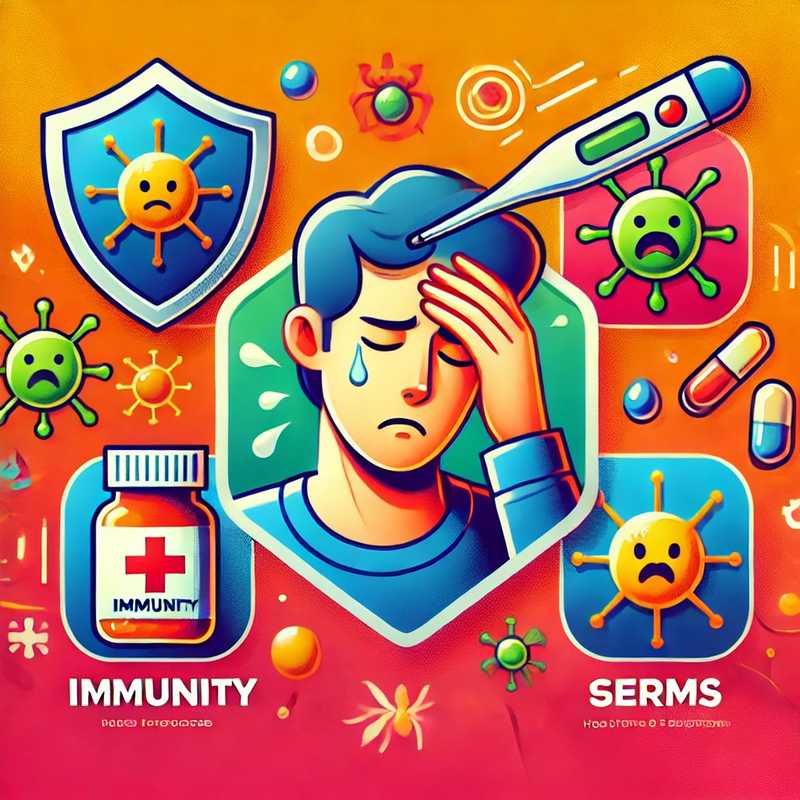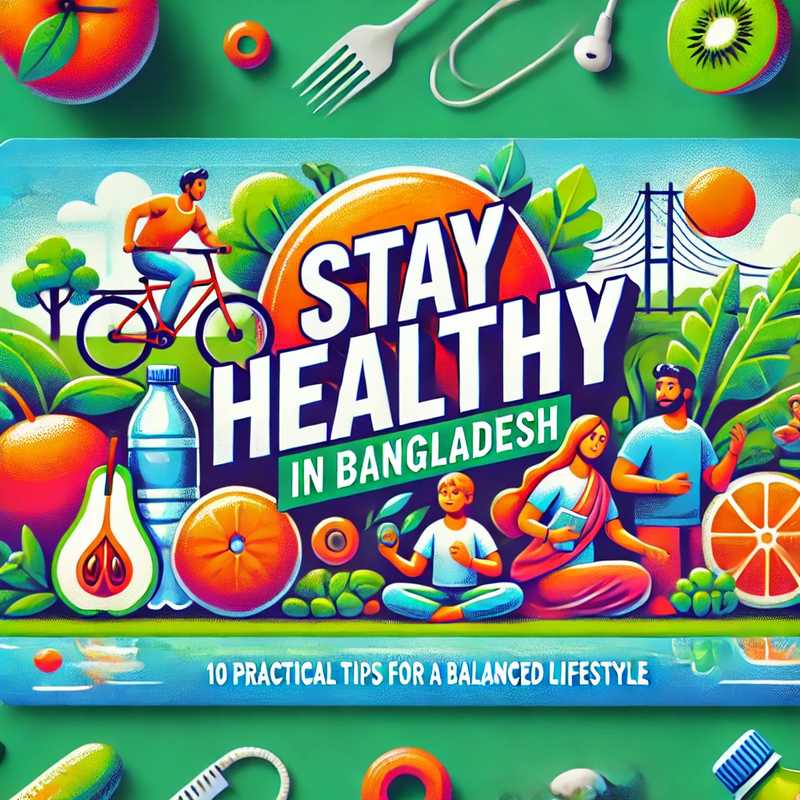
Top 10 Superfoods for Healthy Aging: Nourish Your Body, Boost Longevity

Aging is a natural process, but the foods we eat can significantly influence how well we age. Incorporating nutrient-dense superfoods into your diet can help maintain energy, support brain health, strengthen bones, and keep your skin glowing. In this blog, we’ll explore the top 10 superfoods for healthy aging and how they can help you feel your best at any age.
1. Blueberries: The Antioxidant Powerhouse
Blueberries are packed with antioxidants, particularly anthocyanins, which help combat oxidative stress and inflammation—two key factors in aging. Studies show that blueberries can improve brain function and memory, making them a great choice for maintaining cognitive health as you age.
How to Enjoy: Add them to smoothies, oatmeal, or enjoy them as a snack.
2. Fatty Fish: Omega-3s for Brain and Heart Health
Fatty fish like salmon, mackerel, and sardines are rich in omega-3 fatty acids, which support heart health, reduce inflammation, and promote brain function. Omega-3s are also linked to a lower risk of age-related cognitive decline.
How to Enjoy: Grill or bake fish for a delicious and healthy main dish.
3. Leafy Greens: Nutrient-Dense and Anti-Aging
Spinach, kale, and Swiss chard are loaded with vitamins A, C, and K, as well as folate and calcium. These nutrients support bone health, improve skin elasticity, and protect against chronic diseases.
How to Enjoy: Add leafy greens to salads, soups, or smoothies.
4. Nuts and Seeds: Healthy Fats and Protein
Almonds, walnuts, chia seeds, and flaxseeds are excellent sources of healthy fats, fiber, and protein. They help reduce cholesterol, support heart health, and keep you feeling full and energized.
How to Enjoy: Sprinkle them on yogurt, oatmeal, or eat a handful as a snack.
5. Avocados: Healthy Fats for Skin and Joints
Avocados are rich in monounsaturated fats, which support heart health and keep skin hydrated. They also contain potassium, which helps regulate blood pressure, and antioxidants like lutein, which promote eye health.
How to Enjoy: Spread avocado on toast, add it to salads, or make guacamole.
6. Sweet Potatoes: Beta-Carotene for Skin and Immunity
Sweet potatoes are high in beta-carotene, which the body converts into vitamin A. This nutrient supports skin health, boosts immunity, and promotes eye health. They’re also a great source of fiber, which aids digestion.
How to Enjoy: Bake or roast sweet potatoes as a side dish or main course.
7. Greek Yogurt: Probiotics for Gut Health
Greek yogurt is rich in probiotics, which support gut health and boost the immune system. It’s also high in protein and calcium, making it great for maintaining muscle mass and bone strength.
How to Enjoy: Enjoy it with fruit and honey or use it as a base for smoothies.
8. Turmeric: Anti-Inflammatory Spice
Turmeric contains curcumin, a powerful anti-inflammatory compound that can help reduce joint pain and protect against chronic diseases. It’s also linked to improved brain health and a lower risk of heart disease.
How to Enjoy: Add turmeric to soups, curries, or golden milk.
9. Dark Chocolate: Antioxidants for Heart Health
Dark chocolate (with at least 70% cocoa) is rich in flavonoids, which improve heart health, lower blood pressure, and boost brain function. It’s also a delicious way to satisfy your sweet tooth.
How to Enjoy: Enjoy a small square as an afternoon treat.
10. Green Tea: Hydration and Longevity
Green tea is loaded with antioxidants called catechins, which protect cells from damage and reduce inflammation. Regular consumption is linked to a lower risk of heart disease, improved brain function, and better weight management.
How to Enjoy: Sip on a cup of green tea in the morning or afternoon.
Incorporating these superfoods into your diet can help you age gracefully, maintain your energy, and reduce the risk of chronic diseases. Remember, healthy aging isn’t just about what you eat—it’s also about staying active, managing stress, and getting enough sleep. Start adding these superfoods to your meals today and enjoy the benefits for years to come!
References
- Harvard T.H. Chan School of Public Health. (2023). The Nutrition Source: Blueberries. Retrieved from https://www.hsph.harvard.edu
- National Institutes of Health (NIH). (2023). Omega-3 Fatty Acids: Fact Sheet for Health Professionals. Retrieved from https://ods.od.nih.gov
- Mayo Clinic. (2023). Nutrition and Healthy Eating: Antioxidants. Retrieved from https://www.mayoclinic.org
- American Heart Association. (2023). Healthy Eating: Nuts and Seeds. Retrieved from https://www.heart.org
- WebMD. (2023). Health Benefits of Turmeric. Retrieved from https://www.webmd.com
Related Posts

How does blood donation really work? Is it safe for spouses or family members to donate blood to one another? This blog explores whether it's safe and scientifically advisable to donate blood within the family.
Why Blood Type Matching is Crucial
The most important requirement in blood donation is a match in ABO and Rh blood types.
If the blood types do not match correctly, the recipient’s immune system can trigger a dangerous transfusion reaction.
- O-negative: Universal donor (can give to anyone)
- AB-positive: Universal recipient (can receive from anyone)
Incorrect matches can lead to life-threatening immune responses.
What is Directed Donation?
When a specific person (like a spouse or family member) donates blood for a patient, it's called a Directed Donation. This is legal in many countries but comes with some important guidelines:
- The donor must pass all screening tests
- The donation should be planned in advance
- A doctor’s approval and supervision are essential
🧪 Organizations like the Red Cross provide clear guidelines for this process.
What Are the Risks of Family Member Blood Donations?
1. GVHD (Graft-versus-Host Disease)
This is a rare but serious complication when receiving blood from a close relative.
To reduce the risk, the blood should be irradiated to disable white blood cells.
2. Alloimmunization
Receiving repeated transfusions from relatives may lead to the development of antibodies in the recipient's body, which complicates future blood transfusions.
3. Risk of Infections
Family members might feel emotional pressure to donate and could hide certain risk factors, increasing the chance of transmitting infections.
How to Ensure a Safe Blood Donation from Family
- Always consult a medical professional before accepting blood from a relative
- Verify the donor’s complete screening results
- Use irradiated blood if it’s from a close relative
- Voluntary, non-directed donors are often safer and more reliable
Yes, spouses and family members can donate blood to each other — but certain strict guidelines and safety measures must be followed. Never accept blood from relatives without consulting a healthcare provider.
Saving a life is the goal, but it must be done the safest way possible.
References:
- American Society of Hematology – Blood Matching
- Red Cross – Directed Donation Guide
- Times of India – Blood ties that can kill
- NCBI – Alloimmunization Risk in Transfusions

Growing children need the right nutrients to fuel their rapid physical development, busy brains, and endless energy. But between picky eating, school schedules, and snack cravings, ensuring balanced nutrition can feel like a puzzle. Backed by science and expert guidelines, these 10 practical tips will help you nourish your child’s body and mind—without the mealtime battles!
1. Prioritize Protein for Growth Spurts
Protein builds muscles, bones, and tissues, making it essential during growth spurts. Serve kid-approved options like:
- Eggs (scrambled, boiled, or in pancakes)
- Greek yogurt with berries or honey
- Lean meats, fish, or plant-based proteins like lentils and tofu.
Pro Tip: Blend silken tofu or nut butter into smoothies for a protein boost!
Reference: American Academy of Pediatrics – Protein Needs for Children
2. Choose Complex Carbs for Steady Energy
Swap sugary cereals and white bread with slow-digesting carbs to avoid energy crashes:
- Whole-grain bread, oats, or quinoa
- Sweet potatoes, brown rice, or whole-wheat pasta
Why It Works: Complex carbs provide sustained energy for school and playtime.
Reference: Dietary Guidelines for Americans – Carbohydrates
3. Fuel Brains with Omega-3 Fatty Acids
Omega-3s (DHA and EPA) are critical for cognitive development and mood regulation. Try:
- Fatty fish like salmon or sardines (bake into nuggets for picky eaters)
- Walnuts, chia seeds, or omega-3 fortified eggs.
Science Says: Studies link omega-3s to improved memory and focus in kids.
Reference: NIH – Omega-3s and Brain Health
4. Pair Calcium + Vitamin D for Strong Bones
This duo supports bone growth and immune function:
- Dairy: Milk, cheese, or low-sugar yogurt
- Non-dairy: Fortified plant milks, leafy greens, or tofu.
Bonus: Sunlight helps synthesize vitamin D—aim for 15-30 minutes of outdoor play daily!
Reference: American Academy of Pediatrics – Calcium Requirements
5. Iron-Rich Foods to Prevent Fatigue
Iron deficiency can cause tiredness and poor concentration. Include:
- Lean red meat, turkey, or chicken
- Spinach, beans, or iron-fortified cereals.
Pro Tip: Pair with vitamin C-rich foods (e.g., oranges, bell peppers) to boost absorption.
Reference: CDC – Iron Deficiency in Children
6. Serve a Rainbow of Fruits & Veggies
Colorful produce delivers antioxidants, vitamins, and fiber. Make it fun:
- Create an “Eat the Rainbow” chart for tracking daily colors.
- Sneak veggies into sauces (e.g., blended spinach in pasta sauce).
Reference: American Heart Association – Benefits of Fruits & Vegetables
7. Hydrate with Water, Not Sugary Drinks
Dehydration leads to irritability and fatigue. Encourage water with:
- Fruit-infused water (add strawberries or cucumber slices)
- Homemade popsicles made from diluted juice.
Avoid: Sugary sodas and juices linked to obesity and tooth decay.
Reference: WHO – Sugar Guidelines for Children
8. Smart Snacking for Nutrient Gaps
Replace chips and cookies with wholesome snacks:
- Apple slices + almond butter
- Hummus + veggie sticks
- Trail mix (nuts, seeds, dark chocolate chips).
Reference: CDC – Healthy Snack Ideas
9. Limit Added Sugars
Excess sugar harms energy levels, teeth, and long-term health. Check labels for hidden sugars in:
- Flavored yogurts, granola bars, and cereals.
Swap: Offer fruit-based desserts like banana “nice cream” or berry parfaits.
Reference: American Heart Association – Sugar Limits
10. Family Meals Build Healthy Habits
Shared meals improve diet quality and family bonds:
- Involve kids in meal prep (they’ll eat veggies they’ve chopped!).
- Keep conversations positive—no pressure to clean plates.
Reference: Journal of Family Psychology – Benefits of Family Meals
Sample Kid-Friendly Meal Plan
- Breakfast: Oatmeal with blueberries + scrambled eggs
- Lunch: Turkey & avocado wrap + carrot sticks + apple
- Snack: Yogurt with granola + sliced banana
- Dinner: Baked salmon, quinoa, and roasted broccoli
Common Nutrition Mistakes to Avoid
- Skipping breakfast (linked to poor focus in school).
- Over-relying on processed “kid foods” (e.g., chicken nuggets, fries).
- Restricting treats entirely (balance prevents binge-eating).
Nutrition isn’t about perfection—it’s about progress! By incorporating these tips, you’ll support your child’s immunity, brainpower, and growth while fostering a positive relationship with food. Small changes today = lifelong health rewards!
References
Additional Resources:

Stay nourished, hydrated, and energized during Ramadan with these science-backed dietary tips.
Why Nutrition Matters During Ramadan
Fasting during Ramadan requires careful planning to maintain energy levels, avoid dehydration, and sustain overall health. Choosing nutrient-dense foods at Suhoor (pre-dawn meal) and Iftar (evening meal) can help you power through the day while honoring the spiritual essence of the month.
Top 10 Foods to Energize Your Fast
1. Dates
- Why: Rich in natural sugars (glucose, fructose), fiber, potassium, and magnesium, dates replenish energy quickly and prevent muscle cramps.
- Science: A study in Nutrition Journal found dates stabilize blood sugar levels after fasting (Alkaabi et al., 2011).
- How to Eat: Break your fast with 1-3 dates + water to kickstart digestion.
2. Whole Grains (Oats, Quinoa, Brown Rice)
- Why: Slow-digesting carbs provide sustained energy and prevent hunger spikes.
- Science: The WHO recommends whole grains for stable blood glucose (WHO, 2023).
- How to Eat: Oatmeal at Suhoor or quinoa salads at Iftar.
3. Protein-Rich Foods (Eggs, Lentils, Chicken)
- Why: Protein preserves muscle mass and keeps you full longer.
- Science: A study in The American Journal of Clinical Nutrition highlights protein’s role in reducing hunger during fasting (Leidy et al., 2015).
- How to Eat: Grilled chicken, lentil soup, or boiled eggs at Suhoor.
4. Hydrating Fruits (Watermelon, Cucumber, Oranges)
- Why: High water content (90%+) combats dehydration.
- Science: The European Food Safety Authority emphasizes hydration for cognitive function during fasting (EFSA, 2010).
- How to Eat: Add watermelon to Iftar or cucumber to salads.
5. Nuts and Seeds (Almonds, Chia Seeds)
- Why: Healthy fats and fiber curb cravings and boost energy.
- Science: The Journal of Nutrition links nuts to improved satiety (Mattes et al., 2008).
- How to Eat: A handful of almonds at Suhoor or chia pudding.
6. Yogurt or Laban
- Why: Probiotics aid digestion; calcium supports bone health.
- Science: The International Journal of Food Sciences and Nutrition notes yogurt’s role in gut health during fasting (Marette et al., 2017).
- How to Eat: Pair with fruit or oats at Suhoor.
7. Leafy Greens (Spinach, Kale)
- Why: Iron and magnesium fight fatigue and muscle cramps.
- Science: The NIH highlights iron’s role in oxygen transport during fasting (NIH, 2021).
- How to Eat: Add to soups or smoothies.
8. Avocado
- Why: Monounsaturated fats provide long-lasting energy.
- Science: A Nutrition Reviews study links avocados to improved metabolic health (Dreher et al., 2013).
- How to Eat: Spread on whole-grain toast or add to salads.
9. Lentils and Legumes
- Why: Fiber + protein = sustained energy and stable blood sugar.
- Science: The Harvard School of Public Health recommends legumes for fasting diets (Harvard T.H. Chan, 2023).
- How to Eat: Lentil soup or hummus at Iftar.
10. Herbal Teas (Ginger, Mint)
- Why: Soothe digestion and reduce bloating.
- Science: The Journal of Ethnopharmacology highlights ginger’s anti-inflammatory benefits (Grzanna et al., 2005).
- How to Eat: Sip after Iftar to aid digestion.
Foods to Avoid
- Processed Sugars (sodas, sweets): Cause energy crashes.
- Fried Foods: Slow digestion and trigger fatigue.
- Excess Caffeine: Dehydrates the body.
Pro Tips for Suhoor & Iftar
- Suhoor: Prioritize protein + fiber (e.g., eggs + whole-grain bread).
- Iftar: Start with dates + water, then a balanced meal (protein, veggies, carbs).
- Hydrate: Aim for 8 cups of water between Iftar and Suhoor.
References
- Alkaabi, J. M., et al. (2011). Glycemic indices of five varieties of dates in healthy and diabetic subjects. Nutrition Journal.
- WHO. (2023). Healthy Diet. World Health Organization.
- Leidy, H. J., et al. (2015). The role of protein in weight loss and maintenance. The American Journal of Clinical Nutrition.
- EFSA. (2010). Scientific Opinion on Dietary Reference Values for Water. European Food Safety Authority.
- Harvard T.H. Chan School of Public Health. (2023). Legumes and Pulses.

Your immune system is your body's first line of defense against infections, bacteria, viruses, and other pathogens. However, when your immune system becomes weak, you may fall sick more easily. But how can you tell if your immune system or disease resistance is weak? In this blog, we’ll discuss the signs, causes, and solutions to strengthen your immunity.
Signs of a Weak Immune System
- Frequent Illness:
If you often catch colds, flu, or other infections, it could be a sign of a weak immune system. - Fatigue and Weakness:
Feeling tired even after adequate sleep may indicate low immunity. - Slow Wound Healing:
If cuts or wounds take longer than usual to heal, it could be a sign of a weakened immune system. - Digestive Issues:
Frequent stomach problems like diarrhea, gas, or bloating may suggest poor immunity. - Stress and Anxiety:
Chronic stress can weaken your immune system over time.
Causes of a Weak Immune System
- Unhealthy Diet: Lack of vitamins, minerals, and antioxidants can weaken immunity.
- Lack of Sleep: Inadequate sleep reduces immune system efficiency.
- Chronic Stress: Prolonged stress hampers the production of immune cells.
- Physical Inactivity: A sedentary lifestyle can weaken your immune system.
- Smoking and Alcohol: These habits can damage your immune system.
How to Strengthen Your Immune System
- Eat a Balanced Diet:
Include fruits, vegetables, proteins, and healthy fats in your diet. Vitamins like C, D, and zinc are essential for immunity. - Exercise Regularly:
Aim for at least 30 minutes of moderate exercise, such as walking, cycling, or yoga, every day. - Get Enough Sleep:
Try to sleep 7-8 hours every night to support your immune system. - Manage Stress:
Practice meditation, yoga, or hobbies to reduce stress levels. - Avoid Smoking and Alcohol:
These habits can harm your immune system.
References
- Harvard Health Publishing. (2021). How to boost your immune system. Retrieved from https://www.health.harvard.edu
- National Institutes of Health (NIH). (2020). The Immune System and Primary Immunodeficiency. Retrieved from https://www.nih.gov
- Mayo Clinic. (2022). How to strengthen your immune system. Retrieved from https://www.mayoclinic.org
Popular Blogs

Stay Healthy in Bangladesh: 10 Practical Tips for a Balanced Lifestyle

Maternal Health and Pregnancy Care in Bangladesh: Progress, Challenges, and the Way Forward

Ramadan Nutrition Guide Top 10 Foods to Energize Your Fast

Understanding Sarcoma: Causes, Types, Symptoms, and Treatment Options for This Rare Cancer
